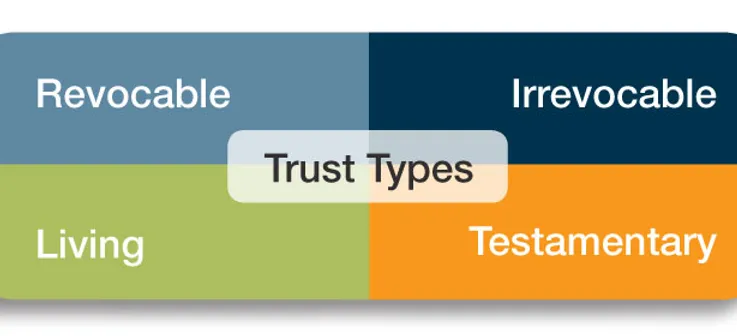- Call for Consultation: 212-843-4059 Tap Here to Call Us
Estate Planning with Different Types of Trusts
A trust is a device for controlling how assets are held and distributed. Trusts can be revocable or irrevocable. There are many differnt types of trusts. A trust that is created during the lifetime of the person creating the trust (referred to as the grantor, settlor or trustor) is known as a “living trust” or an “inter-vivos” trust. A trust that is established in a will only comes into existence after the will maker’s death and is known as a testamentary trust.

Types of Trusts: Revocable Trusts
A revocable living trust should be considered in the following situations:
- You have assets in more than one state;
- You wish to avoid the cost and time delays associated with probate;
- You are concerned about privacy (a will becomes a public document; and/or
- You wish to ensure ease of administering your assets if you become incapacitated.
A revocable living trust does NOT offer any asset protection with respect to the assets transferred to the trust and it does NOT reduce your estate taxes in any way that cannot be accomplished through a will.
When a revocable living trust is part of an estate plan, the dispositive provisions (i.e., the blueprint of the estate plan… the who gets what, when details) will appear in the trust agreement and not the will. However, you will still need a will to handle any assets that were not transferred to the revocable trust during your lifetime. Plus, if you have minor children, the will is needed to nominate guardians for those minor children. The will operates to pour over any assets that are outside the trust into the trust at the time of your death. Thus a will of this sort is typically called a “pour over will.”
Types of Trusts: Irrevocable Trusts
With an irrevocable trust the grantor completely relinquishes title to the property and does not retain a right to alter, amend or revoke the trust. Since the grantor gives up all control and dominion over the transferred property, the assets of an irrevocable trust are not includible in the grantor’s gross estate for federal estate tax purposes. Irrevocable Trusts are also used to shield certain assets from potential future creditors by removing them to a trust
over which neither the grantor nor the beneficiary has discretionary control.
Need Help Creating or Updating Your Estate Plan? Contact Our Firm Today.
At Adler & Adler, we are dedicated to helping our clients protect their assets and families and ensure that your wishes are heard and honored. Once you retain our services, we can advise you on all aspects of your estate planning. Contact us today: 212-843-4059 or 646-946-8327.

